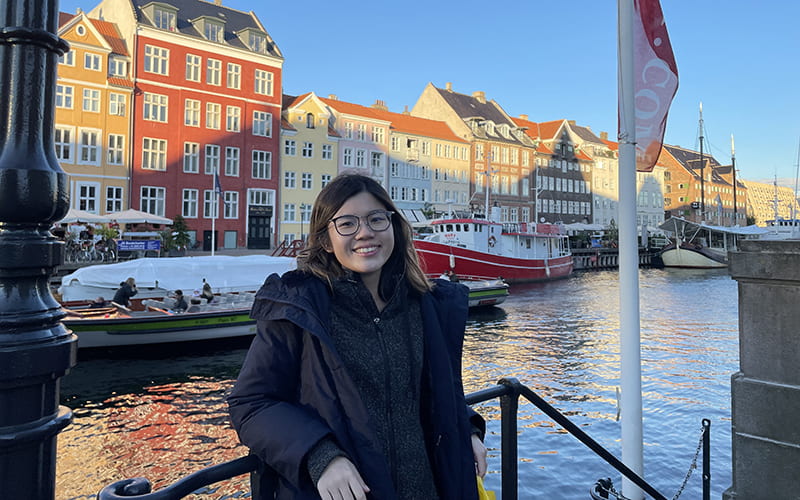A deep dive into academia: Reflections from an undergraduate research assistant
By IOE Blog Editor, on 20 March 2024

Credit: Alex Wong.
20 March 2024
By Alex Wong, Social Sciences BSc
Looking back, completing my undergraduate journey at University College London (UCL) was a most unique and fulfilling experience despite, or perhaps in addition to, being one of the lucky few to start tertiary education during the pandemic. Of the many memorable experiences I have had, one definitely stuck with me. During the summer before my final year at UCL, I had the wonderful opportunity to deep dive into academia beyond my programme diet by interning as a Research Assistant (RA) under Dr Katie Gaddini.
Dr Gaddini taught one of my core course modules during my second undergraduate year. Throughout the term, dissecting what good research is and being exposed to the multitudes of methods that are used in qualitative research increasingly motivated me to explore how the research process would look like ‘on the ground’ – the complexities behind brainstorming, data collection, analysis and write-up that did not make it onto the pages.
Additionally, the political sociology classes I took further inspired me to explore some of Dr Gaddini’s publications on the intersections between religion and politics.
So, with a little courage, I reached out to her to share my interests in her research area as well as a rough idea: if I could take part in one of her current research activities. This marked the beginning of an exciting six-week journey.
Dr Gaddini very generously suggested that I could help with her ongoing research project as an RA. In our initial meeting, I learnt about the role I would play in her project, ‘The Politics of Religion.’ It was a steep yet highly rewarding learning curve, as I turned my attention to focus on how religion, specifically Evangelical Christianity, played a role in influencing people’s political beliefs in the United States. The experience was unforgettable, knowing that my contribution would work towards creating a more in-depth and nuanced understanding of the co-constitutive relationship between religion and politics globally. Being able to see in real time how the findings concur or challenge what I have previously discussed in my political sociology classes was an added bonus, further deepening my knowledge in the field during my internship.
The experience broadened my understanding of the qualitative research process, especially one that spans years. One of my main tasks involved the analysis of Dr Gaddini’s primary research data and turning recurring themes into takeaway points that would serve the wider public. This was perhaps one of the most challenging aspects of the internship. Exploring how to articulate research findings for a broader audience enabled me to gain a deeper appreciation of the intersections between academia and wider society.
I also had a unique opportunity to undertake my own primary research in the form of a social media analysis of key online figures. This involved a deep dive into various social media sites, analysing the way online personas are created, their favoured topics and styles of content creation. It was a particularly rich experience as my primary research coincided with the overturning of Roe v. Wade in the US. With Dr Gaddini’s guidance, she not only honed my research skills but also underscored the dynamic nature of social research in the digital age.
This internship actively shaped my academic journey. Firstly, the lessons I learnt from undertaking my own primary research played a crucial role in shaping my undergraduate dissertation. Employing similar methods, I applied the skills and insights gained during the summer to further engage with social media data collection for qualitative research. Specifically, I spent much time pouring over the conversations Dr Gaddini and I had on the ethics of social media research. This became crucial in helping me navigate my dissertation later on.
Moreover, much of what I learnt continued to support my endeavours. For instance, I was better equipped to draft my own research proposal, undertake primary research and distil the findings appropriate for a wider audience in other internships. My work as RA also provided me with the foundations to further explore my academic interests in my Master’s programme at LSE.
As I continue my academic journey, I find myself reflecting on the profound impact of this internship. It reaffirmed my interest in academic research that explores the intricacies of political engagement. Moreover, engaging in primary research with guidance from a renowned researcher in the field was also an extremely enriching and unforgettable experience. Here, I find myself being deeply appreciative of the time Dr Katie Gaddini has taken to develop my skills and interests. At the risk of sounding cliche, forming a closer relationship with her has been an invaluable part of this journey.
So if you are wondering what you could do this summer or are thinking about taking a quick dive into academia, I encourage you to reach out to the professors around you. It may sound daunting, but the rewards are well worth it.
 Close
Close


